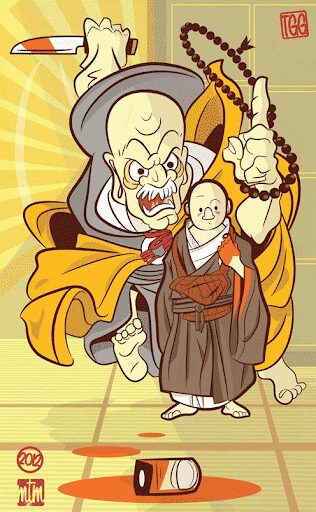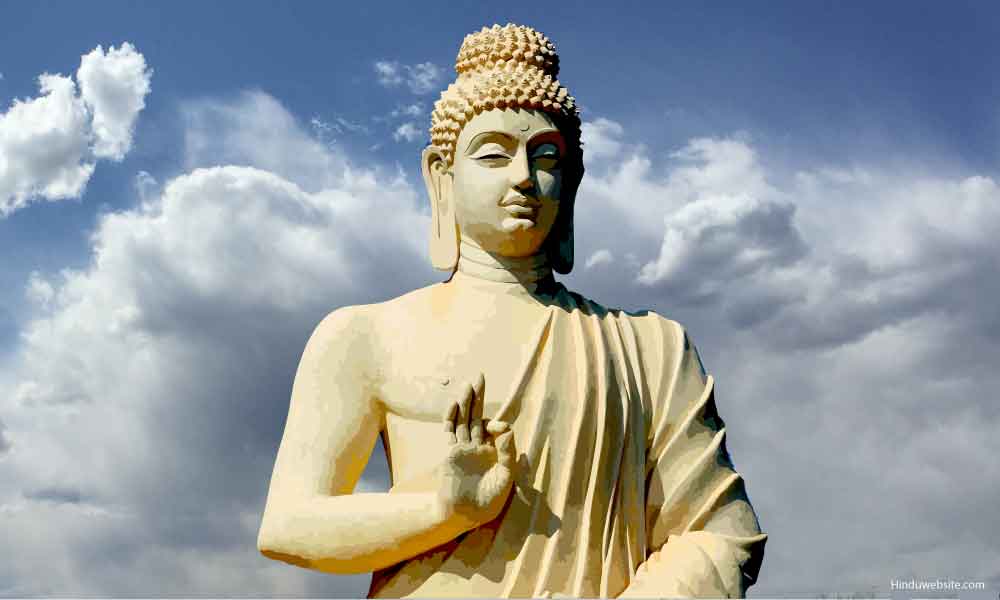Gutei (Chinese: Chu-chih) lived around the ninth century, his dates of birth and death are not available, since his real name is not known. Chu-chih (Gutei) was just a nickname.
In the time of Gutei, the Chinese government persecuted Buddhism, destroying 40,000 Buddhist temples and cancelling the ordination status of 260,000 monks and nuns. This took place in 845 C.E.; the tyrannical rule lasted for twenty months. As a young monk, Gutei lost his temple home. He hid himself in a remote mountain, begging for his food secretly among the villagers.
Gutei lived as a hermit, sitting all alone, practicing zazen in a little hut up in the mountains. He practiced very intensely, and entered deep into the great silence of samadhi.
One evening, a nun – by the name Shih-chi (Jissai) which can be translated as “True World” or “True Encounter” – who was on a pilgrimage, appeared at his hut. She walked into the hut, where Gutei sat in zazen, walked around his seat three times, (the circumambulation is a ritual found in many traditional societies, and for Zen Buddhism this is a way of self-presentation done by a pilgrim to a teacher, followed by three deep bows and other procedures), banged her staff on the ground, and said: “If you can say a word of Zen, I’ll take my hat off and stay.”
- ‘To say something’ is in Zen terminology to say something to reveal the mind. The nun’s question was intended to probe Gutei’s ability to understand the truth.
Gutei didn’t know what to say, so the nun again walked around him three times and repeated her challenge.
Again, Gutei sat tongue-tied, unable to come up with a “word of Zen” that could adequately express what he experienced in his zazen.
She repeated her performance one more time, but all she could get was the same silence.
Disgusted, she turned on her heels and left.
This encounter completely troubled poor Gutei. Despite all his years of deep meditation, he had failed the test. Why couldn’t he come up with a “word of Zen?” A chasm had opened up between all the words he knew perfectly well and the mysterious “Zen word” the nun demanded, and he fell right in. Gutei decided he better stop sitting by himself and seek out a teacher.
But that night he had a dream in which he was told not to leave his hut and his teacher would soon appear. The next day, Tenryu (T’ien-lung) arrived. Gutei told him the whole story of how he was humiliated by the nun. Having listened to it all, Tenryu simply raised one finger, whereupon Gutei had his realization.
***
To understand Gutei’s realization, we have to understand what preceded it: all the confidence he had built up during his years of sitting alone were shattered by his encounter with the nun. All that had to be taken away. He had to lose what he knew in order to simply experience What Is.
Gutei’s mistake was to think that just sitting was enough in itself. He devoted himself to this practice, which is a right thing to do. But is not enough. He was not making himself available to What It Is. He was just entertaining an illusion. He was not open to the True World, to the True Encounter. Because he was still deluded, he could not say anything in response to the nun’s question.
But, Gutei’s potentiality was already aroused to the full and required only someone to provoke its union with the absolute. So, the simple gesture of raising of a finger, although was not just a simple gesture, leaded him to the enlightenment. Because, in that moment, this gesture was enough to open Gutei’s mind at once to the ultimate meaning of Zen, and it is said that ever since Gutei did or said nothing but just hold up a finger to all the questions that might be asked of him concerning Zen.
At the end of his life, Gutei said to his disciples:
“I attained my one-finger Zen from my teacher, Tenryu, and throughout my whole life, I have not exhausted it.”
photo credit




